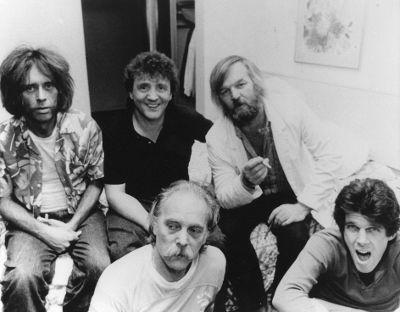
Over fifty five years ago, the debut album by the San Francisco band Moby Grape was released on Columbia Records. Generally hailed as one of the finest recordings from the ’60s San Francisco scene—and often as one of the great debuts of all time, period—its June 6, 1967, release presaged a series of missteps, legal sagas and tragedies that have since become legend.
In this edited excerpt from Best Classic Bands editor Jeff Tamarkin’s 2003 biography, Got a Revolution! The Turbulent Flight of Jefferson Airplane, he recounts the tale of Moby Grape and the band’s enigmatic co-founder Skip Spence.
***
In the summer of 1965, the recently formed Jefferson Airplane decided to dismiss their first drummer, Jerry Peloquin. That’s when a golden boy named Alexander “Skip” Spence came waltzing into [San Francisco’s] Matrix club and was immediately signed up by Marty Balin, the band’s co-founder.
Spence had little experience as a drummer but Balin just knew he’d be right for the group. He sent Spence home with a pair of drumsticks and he soon debuted with the band, playing on their first album, Jefferson Airplane Takes Off. Spence wasn’t one for staying in the same place very long though, and he took off to Mexico one day with a girlfriend or two, neglecting to tell the band he was leaving. They decided he wasn’t going to work out and Spence was soon replaced by Spencer Dryden, who remained the Airplane’s drummer throughout their key years of 1966-70.
Related: The Summer of Love, by those who were there
In the summer of ’66, Skip returned to the Bay Area from Mexico and resurfaced with a new band, Moby Grape, this time playing guitar, his first instrument. They woodshedded in Marin County for months and played their first gig at the city’s California Hall on November 4; everyone who heard them agreed that this was an astounding band.
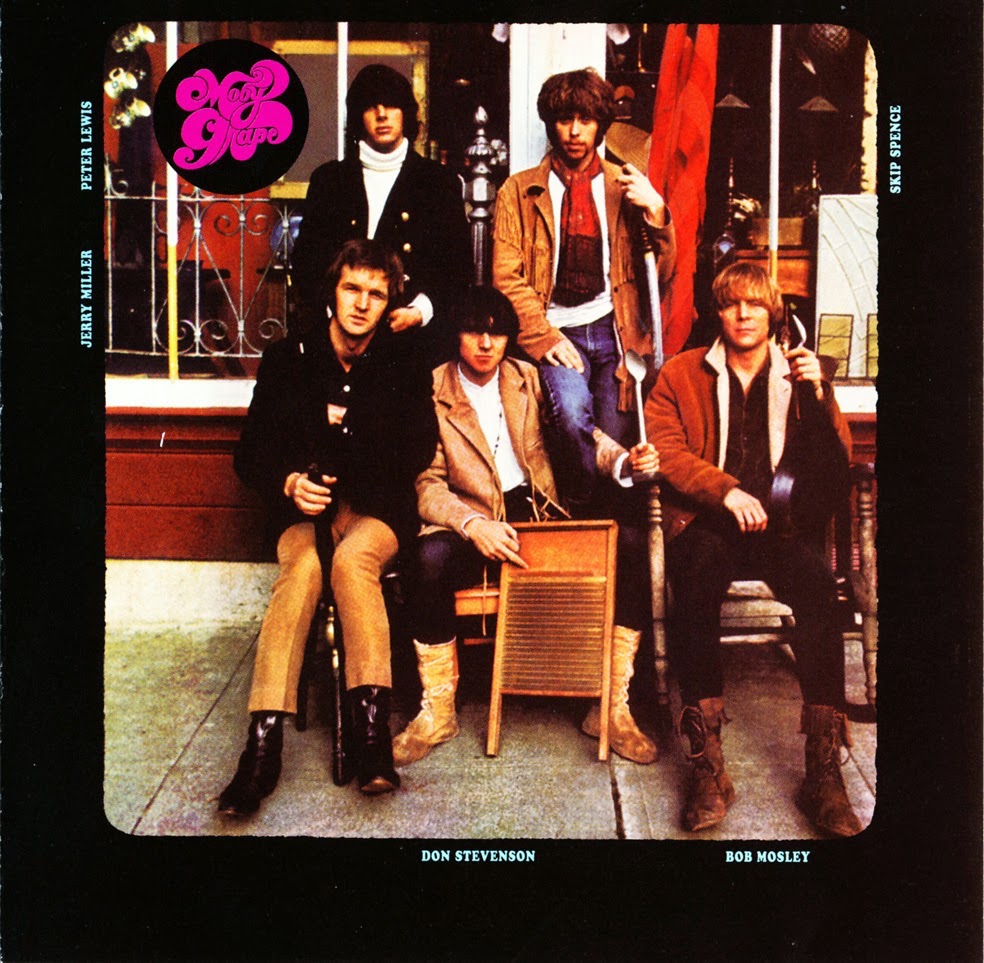
The Airplane—who’d been working in Los Angeles on their sophomore album, Surrealistic Pillow, and playing gigs out of town—missed the chance to catch their former drummer’s new band right away. What really confused the Airplane, however, was learning that the Grape was managed by Matthew Katz. Katz had also been the Airplane’s first manager, and he’d given them nothing but grief. Subsequent lawsuits involving Katz would tie up the court system for a whopping 21 years. Why Skip Spence would choose to continue working with Katz was just one of the many unfortunate mysteries in which his life became entangled during the three-plus decades following his Airplane tenure.
The Grape’s saga is one of squandered potential, absurdly misguided decisions, bad luck, blunders and excruciating heartbreak, all set to the tune of some of the greatest rock and roll ever to emerge from San Francisco. Moby Grape could have had it all, but they ended up with nothing, or less.
Katz had helped engineer the Grape’s formation. In addition to Spence, the quintet included two other guitarists: Peter Lewis (the son of actress Loretta Young), who used to play with Spencer Dryden down in L.A. and was most recently working with a band called Peter and the Wolves; and Jerry Miller. Miller and drummer Don Stevenson had played together in a bar band in the Pacific Northwest called the Frantics, and Miller had earlier worked with Bobby Fuller, the Texan rocker who died under mysterious circumstances in the summer of ’66 just months after scoring a Top 10 hit with the Sonny Curtis-penned “I Fought The Law.”
Related: Moby Grape was a highlight of the Monterey Pop Festival. Who were the others?
The Frantics relocated to San Francisco in 1965, where bassist Bob Mosley worked with them briefly. Mosley recommended Miller and Stevenson to fill out the lineup of the proposed new group, which took its moniker from the punch line of a dumb joke: “What’s purple and swims in the ocean?”
At first, the rest of the Grape-to-be wasn’t sure about working with Spence.
Jerry Miller: He was a little bit too crazy, even then. When we first met him, he looked a little bit crazed. He was one of the first guys I’d seen with ratted hair. And he’d laugh hysterically when he’d get the feeling. But he played excellent rhythm guitar. He did these things where he would muffle the strings. And he did that better than anybody, ever. And when the five of us played together, there was something happening that was undeniable.
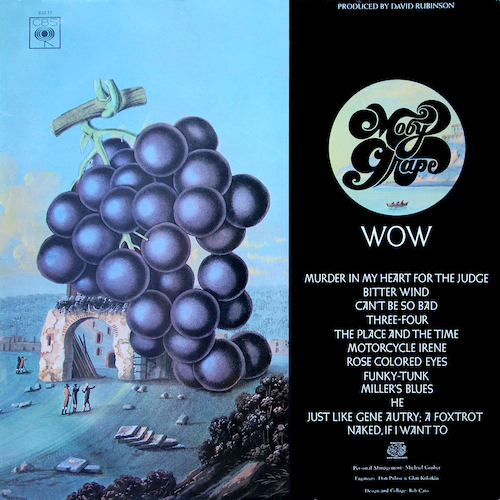
Moby Grape was a record company’s dream band when they debuted. Their complementary three-guitar lineup produced a thunderous noise, not unlike what Buffalo Springfield was doing down in L.A., and each member of the band could sing. Their songs were expertly composed and had both commercial possibilities and the integrity demanded by San Francisco audiences. They looked great onstage—they had a real presence, and real moves, unlike some of the other local bands—and put on a dazzling performance. Many felt that they were the most accomplished band on the scene musically from the moment they showed up. They were tight, and worked within structures that were anathema to some of their peers in the city.
Said keyboardist and singer Al Kooper, then working in New York with the Blues Project, “The only San Francisco band that did anything for me was Moby Grape. They adhered to more of a three-minute mentality.”
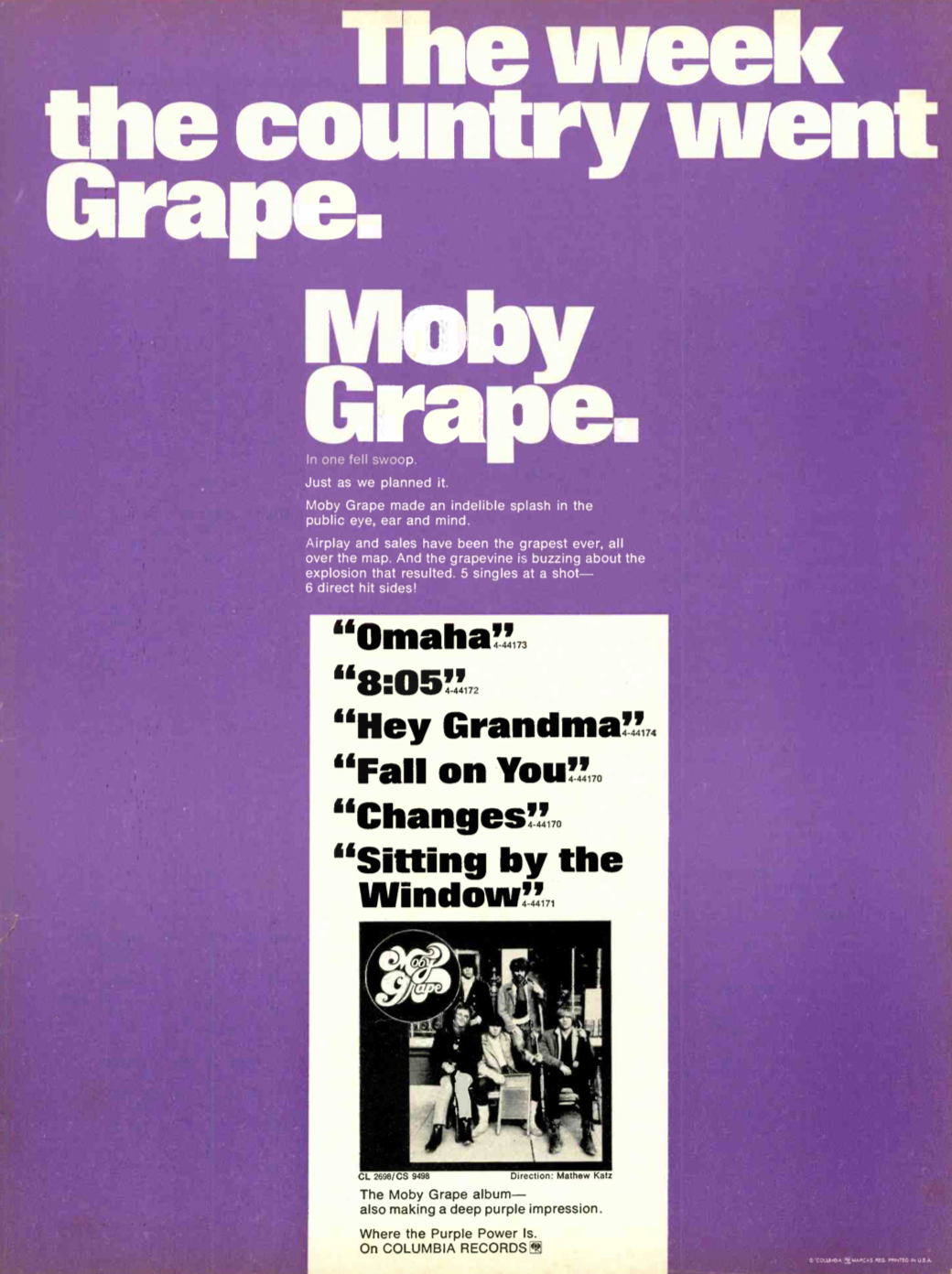
But the Grape was doomed. For starters, they allowed Matthew Katz to retain ownership of their name, precipitating legal battles that continued to tie up the court system clear to the end of the 20th century and kept the musicians from exploiting their own legacy. And in 1967, upon the release of their first album for Columbia Records, hailed by many critics as one of few perfect debuts in rock history, the Grape was the victim of one of the most misguided marketing efforts in the annals of the music industry: the simultaneous release of nearly all of the songs on the album as A-sides or B-sides of singles. By pitting the five records against one another, Columbia effectively canceled out the possibility of any one of them gaining enough momentum to become a hit. The disaster was compounded by a press party at San Francisco’s Avalon Ballroom so overblown in its hype quotient (purple flowers everywhere) that Moby Grape never really recovered.

Katz’s management style proved consistent with the way he’d managed the Airplane. Jerry Miller says that he remembers the Grape missing a photo session for the high-circulation Look magazine because Katz had gotten the time of the shoot wrong.
Things got worse. There were busts and a second album, Wow/Grape Jam, generally considered inferior to the first. And then, in 1968, began the downfall of Skippy Spence. Spence had taken to gobbling tabs of LSD like Pez, and taking harder drugs, becoming increasingly unreliable and unpredictable. While the band was staying in New York, at the Albert Hotel, Spence chopped away at Stevenson and Miller’s hotel room door with a fire axe, and when he failed to find them there, continued on to the studio where the group had been recording.
Producer David Rubinson managed to get the weapon away, but Spence was taken by police, first to the Tombs jail and finally to Bellevue Hospital, where he spent six months undergoing psychiatric care. He was never the same after that—the old Skip Spence, described by everyone as a happy-go-lucky, good-time fellow, falling into a dope-induced psychosis.
Jerry Miller: Skippy changed radically when we were in New York. There were some people there that were into harder drugs and a harder lifestyle, and some very weird shit. And so he kind of flew off with those people. They were really strange, almost Nazi-ish. Skippy kind of disappeared for a little while. Next time we saw him he had cut off his beard, and he had a black leather jacket on, with his chest hanging out, with some chains and just sweating like a son of a gun. I don’t know what the hell he got a hold of, man, but it just whacked him. And the next thing I know, he axed my door down in the Albert Hotel. They said at the reception area that this crazy guy had held an axe to the doorman’s head.
Listen to the ballad “8:05” from Moby Grape’s debut, as performed on The Mike Douglas Show
At the end of 1968, Spence was released, and hopped a Triumph motorcycle pointed toward Nashville, where he recorded the idiosyncratic solo album Oar for Columbia. Although largely ignored in its time, Oar grew in stature as a cult favorite over the years, culminating in the simultaneous 1999 re-release of the album, with bonus tracks appended to it, and a tribute album called More Oar, consisting of new interpretations of the album’s songs by contemporary artists such as Robert Plant of Led Zeppelin and Tom Waits.
But by then, it was too late for Skip Spence. After a near-lifetime as a diagnosed paranoid schizophrenic, living much of the time in institutions as a ward of the state, only occasionally venturing out to make new music with the former members of Moby Grape, Alexander “Skip” Spence died on April 16, 1999, in Santa Cruz, California. He was two days shy of his 53rd birthday. Although the official cause of death was lung cancer, Spence had entered the hospital on April 5 with numerous ailments, including pneumonia, hepatitis and congestive heart failure. His lifestyle and years of poverty and neglect had finally caught up with him. Unlike many other casualties of the ’60s, Spence neither died young nor had a chance to find his way out. Unlike the advice in the Neil Young song, he both burned out and faded away.
Yet he touched so many.
Sam Andrew (of Big Brother and the Holding Company): I went to see the Airplane at the Matrix when they were starting out, and what knocked me out was Skip Spence. He was all I could see the night I went. He was the drummer but he had so much charisma. He was really a great player. He was really driving the band. It was just so complete, such a good sound.
Listen to “Omaha” from the debut
Paul Kantner (of Jefferson Airplane): He wasn’t the preeminent guitar player in Moby Grape, but he probably was responsible for a good 30 to 40 percent of the exuberance of Moby Grape, just him alone. On stage at his height, he was a force to be reckoned with, in terms of joy and participation and passion with what you’re doing and connecting it to people out there. He was a really bright star. He came up with beautiful chord changes and the melodies going through them. He had a real knack for that. He was one of the casualties. That didn’t happen until he left the Airplane. And then he had troubles with Matthew and Moby Grape and acid and heroin and girlfriends; those things all conspired against him to blow him over the hill.
Miller says that the Grape, when they first formed, was unaware of the problems that the Airplane had had with Katz.
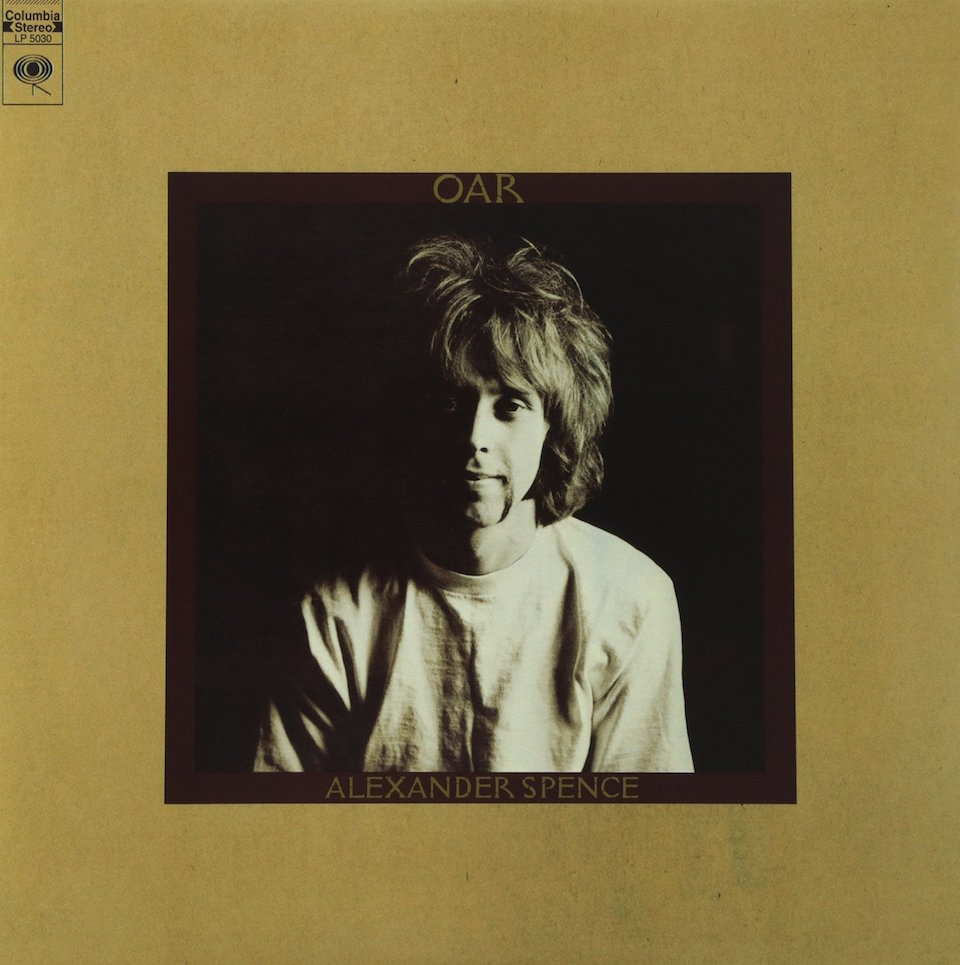
Jerry Miller: Neither Skippy nor Matthew told us that he fell out of favor with them. So it took a while before we found that out that they definitely didn’t like the Matthew guy. He had a talent, but he abused the hell out of it. I’m not real pro-Matthew at all. I wouldn’t piss in his face if his eyebrows were on fire.
The Grape held on until 1969, recording and performing without Spence and Mosley, who, disgusted with the turn of events, joined the Marines in an effort to get far away from the rock ’n’ roll world. Mosley was discharged after nine months, but the Moby Grape saga continued to grow more bizarre and frustrating for the members in subsequent years. In 1970, Katz, who owned the band’s name, put together a new Moby Grape consisting of none of the original members. Eventually a court decision sided with Katz on the ownership of both the name and the Grape’s recorded catalog, making it virtually impossible at times for the original members to capitalize on the music they had created in the ’60s. Even Columbia Records was unable to reissue the Grape’s albums, which came out instead on a label set up by Katz.
There would be other Moby Grape recordings and reunions, both under that name and others—the Legendary Grape, the Melvilles—concocted in an effort to circumvent Katz’s claims on the group, but for the most part, despite the occasional resurfacing, Moby Grape was sunk almost from the start. Katz spent the better part of the years after the band’s original demise in courts fighting appeals and initiating new suits, not just against the Grape but another prominent San Francisco band he managed, It’s a Beautiful Day. (Ed. note: Katz is still alive as of this posting, now over 90 years old. In 2010 he ran unsuccessfully for the Malibu, California, city council.)
Meanwhile, after spending several years in and out of the Grape and other bands, Mosley’s life took a downward spiral, and he spent considerable time homeless before coming around again in the late ’90s. By that time, not only had Miller, Mosley, Lewis and Stevenson reunited as Moby Grape, they had done so legally, the courts finally deciding in their favor on the name ownership issue. Miller, Lewis and Mosley still perform today on occasion as Moby Grape, augmented by Skip’s son, Omar Spence, and Joseph Miller, Jerry’s son. Jerry Miller also performs with his own band.
Watch a rare live video of Moby Grape performing “Hey Grandma” from their debut album
Addendum, 2024: A new biography of Skip Spence, Weighted Down: The Complicated Life of Skip Spence, written by Cam Cobb, was recently published by Omnibus Press. It is the first bio devoted specifically to the former Airplane/Grape member and it available to order here.
Matthew Katz died in 2023, at age 93.
Some Moby Grape recordings are available here.
- Over Under Sideways Down: Making Sense of the Yardbirds’ Album Releases - 05/27/2024
- 17 Classic Chuck Berry Covers - 05/18/2024
- ‘Brandy’ by Looking Glass (It’s a Fine Song) - 05/18/2024


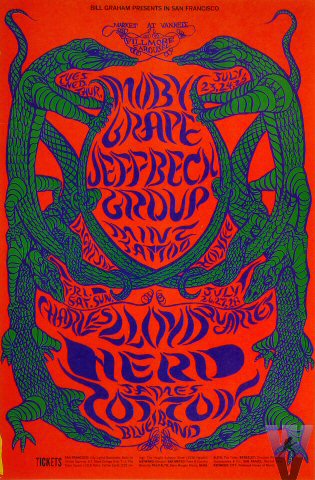
13 Comments
Damn that’s one helluva crazy story. Sad what happened to them. They had so much potential. I was only a little bit into them growing up being a late 60s baby..but it’s easy to see how far they could have gone with the right opportunities and manager…Katz sure seems like a real dick!
I’m glad to see this lore on Moby Grape, who got the attention of many of the musicians I’ve worked with in the years since. They were definitely one of the great under-appreciated bands. However, it’s disappointing to see so much attention devoted to Skip Spence, when other members, including Jerry Miller and Bob Mosely, were way more talented. And the same old stories about cult-figure Spence evidently took up space that could have been spent on this band’s music. Perhaps the most important element in my mind was Jerry MIller’s guitar playing. Many players that I know rank him way up on the list of blues-rock players. His work on the Grape albums — and there’s great stuff on the two later albums — stands up well against anybody you can name. Moseley was a great, intense singer and a talented songwriter. Oh, and Peter Lewis was very cool as well. If he had only recorded the mystical “He” on the second album, he would be well worth remembering. The band brought to bear a high level of musicianship on psychedelia, blues, country and even a bit of gospel as in “Three-Four” on the album “Wow.” I don’t know what to call “Murder in My Heart for the Judge” except great.
I bought their first album in 1967 and it came with a poster with somebody on a washboard giving the middle finger. I hung it on my bedroom wall. I think my favorite song from that album was 8:05. I still like that song!
A biopic could restore the band to the historical greatness that is their due.
Great band. It’s a shame what happened to them. I agree with the comment above. A film about Moby Grape’s story would surely do them justice.
Jeff Tamarkin nailed it when he described the Grape as having recorded a perfect debut album. I got to see them live at the Cafe Au Go Go in NYC and they were great. They headlined that show with the “undercard” being a brand new band whose debut album was still months from release: Blood, Sweat and Tears. I’m talking about the original BS&T with Al Kooper and Steve Katz and Bobby Colomby and that legendary horn section. Years later, I met Colomby and told him I’d been at that show. His reply? “Wasn’t Moby Grape incredible?”
Let’s see, I was playing a gig with my band, at Dartmouth College in 1967, and I was in the student union, when I heard Omaha, I said what the hell is that? I went over to the jukebox and saw Moby grape, went out and bought the album lost it, and bought more I think I’ve got three of them, this songs never leave my head that album has quite an affect on me, wow bought all of their other albums too, but the first one the best, by the way I live in New Hampshire, and there’s a trail up in the mountains called Moby grape, go figure
great piece, jeff… one of these days i’m gonna get off my lazy retired ass and buy your book! thanks… hal
I remember them from 60something. I went to boarding school and there were some fellow students from Ca. They turned us on to Moby Grape and Love. @ of many bands who should have been bigger than they ended up being.
Was at Fillmore East June 1971, bill was random as always BB King, Moby Grape, Grootna, still got the Fillmore program. It’s billed as Skip Spence on guitar but maybe this was when he was commited for the ax incident, perhaps a no show. Whatever still high energy band, then BB King and “The thrill is gone” All for $5.50.
I was at that show too. B.B. was great!
Jerry once told me a story about how the Grape had been recording in NY and, having finished a bit early and having several days before their flight home, he and Don decided to go catch some of the music on what would have been basically the old “Chitlin'” circuit. They had a great time listening to some of the greats, Brownie and Sonny, B.B. and a number of others. The Grape was kind of the house band at the Fillmore and Jerry and Bill Graham were good friends and upon returning to S.F., Jerry walked into Bill’s office and began pulling names and numbers, written on scraps of paper, out of his pockets, telling Bill; “You’ve got to get some of these guys out here!” A few days later, while walking by Bill’s office, Graham called Jerry in and told him; “I called some of those cats and one of them agreed to come out here and play, but, since no one knows who he is, do you mind if he opens for the Grape?” Jerry was happy to agree. In the PBS documentary on the blues, one “chapter” is dedicated to B.B. King. In it he tells about his first big break and the extreme trepidation he felt, playing before a white audience, as in the South, at that time, a black man could get lynched for less.” What happened, of course, was that, once he started to play, the kids went wild. That was the Grape’s crowd. Jerry Miller got B.B. his break and it says volumes about Jerry that he never looks on it that way – and, to my knowledge, never even tells that story. So, I will.
I suppose it’s inevitable that Spence gets the lion’s share of attention in recounting the band’s history, but Lewis’ voice & writing, Stevenson’s excellent drumming (fills second only to Ringo or Levon) and cowriting with Jerry Miller and his big hollow-body sound are all worthy of recognition. And Mosley: was there a better singer ever? He could hold his own with any of the soul shouters (always reminded me a bit of BB King). To me, he was the soul of Moby Grape. Maybe if he’d grabbed an axe, he’d get more of the spotlight.